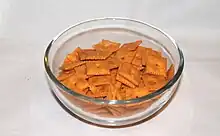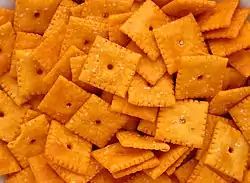 Homemade cheese crackers spiced with rosemary and cinnamon | |
| Type | Cracker |
|---|---|
| Course | Main Meal (in some countries, served as a special course) |
| Variations | Goldfish, Cheddars, Cheese Nips, Cheez-It |
The cheese cracker is a type of cracker prepared using cheese as a main ingredient.[1][2] Additional common cracker ingredients are typically used, such as grain, flour, shortening, leavening, salt and various seasonings.[3][4][5][6] The ingredients are formed into a dough, and the individual crackers are then prepared.[3][7] Some cheese crackers are prepared using fermented dough.[4] Cheese crackers are typically baked.[1][6] Another method of preparing cheese crackers involves placing cheese atop warm crackers.[8] Cheese crackers have been described as a "high-calorie snack", which is due to a higher fat content compared to other types of crackers.[5]
Uses
In addition to being a snack food, cheese cracker crumbs are sometimes used in recipes as an ingredient, and crumbs or whole crackers are sometimes used as a garnish on various foods.[9][10][11] Cheese crackers are also sometimes served as a side dish to accompany foods.[7]
Commercial brands
Examples of mass-produced commercial cheese cracker brands include Better Cheddars, Cheddars, Cheese Nips, Cheez-It and Goldfish.[1]
- Better Cheddars is a brand of baked Cheddar cheese snack cracker manufactured by Nabisco, a subsidiary of Mondelēz International.[1][12][13]
- Cheddars are a brand of baked Cheddar cheese-flavoured British-style savoury biscuit, having a granular crumbly texture unlike crackers which are harder, more brittle and flaky in texture. They are manufactured by McVitie's.
- Cheese Nips are small cheese-flavored crackers[14] manufactured by Mondelēz International under its brand, Nabisco.
- Cheez-It is a cheese cracker manufactured by the Kellogg Company through its Sunshine Biscuits division. Cheez-Its were introduced in 1921 by the Green and Green company of Dayton, Ohio, and through a series of corporate mergers, the brand was acquired by the Sunshine subdivision of Keebler Company in 1996. Keebler, in turn, was acquired by Kellogg in 2001.
- Goldfish are fish-shaped cheese crackers manufactured by Pepperidge Farm, a division of the Campbell Soup Company.[15]
See also
References
- 1 2 3 4 Davis, Robin (August 23, 2000). "Nabisco Nips the Rest In Cheese Cracker Test". SFGate. Retrieved October 9, 2017.
- ↑ Bohn, R.M. (1957). Biscuit and Cracker Production: A Manual on the Technology and Practice of Biscuit, Cracker, and Cookie Manufacture, Including Formulas. American Trade Publishing Company. p. 104. Retrieved October 9, 2017.
- 1 2 Hui, Y.H.; Corke, H.; De Leyn, I.; Nip, W.K.; Cross, N.A. (2008). Bakery Products: Science and Technology. Wiley. p. 420. ISBN 978-0-470-27632-7. Retrieved October 9, 2017.
- 1 2 Kulp, K. (2000). Handbook of Cereal Science and Technology, Second Edition, Revised and Expanded. Food Science and Technology. Taylor & Francis. p. 670. ISBN 978-0-8247-8294-8. Retrieved October 9, 2017.
- 1 2 Bricklin, M.; Magazine, T.E.P. (1994). Prevention Magazine's Nutrition Advisor: The Ultimate Guide to the Health-Boosting and Health-Harming Factors in Your Diet. Rodale Books. p. 464. ISBN 978-0-87596-225-2. Retrieved October 9, 2017.
- 1 2 Manning, I.; Altman, J. (2013). Crackers & Dips: More than 50 Handmade Snacks. Chronicle Books LLC. pp. 21–22. ISBN 978-1-4521-2417-9. Retrieved October 10, 2017.
- 1 2 Joyce Lamont, L.L.S.Z. (2008). Joyce Lamont's Favorite Minnesota Recipes & Radio Memories. Voyageur Press. p. 25. ISBN 978-1-61060-430-7. Retrieved October 10, 2017.
- ↑ Bulletin. Wisconsin Farmers' institutes. 1896. p. 236. Retrieved October 10, 2017.
- ↑ Butler, A. Audubon Plantation Country Cookbook. Pelican Publishing Company. p. 35. ISBN 978-1-4556-0048-9. Retrieved October 10, 2017.
- ↑ Patch, G. (2013). Christmas Kitchen Cookbook. Seasonal Cookbook Collection. Gooseberry Patch. p. 16. ISBN 978-1-62093-108-0. Retrieved October 10, 2017.
- ↑ The Editors of EatingWell (2016). EatingWell Vegetables: The Essential Reference. Houghton Mifflin Harcourt. p. 159. ISBN 978-0-544-71531-8. Retrieved October 10, 2017.
- ↑ Wood, D.J. (2007). Brands and Their Companies. A Gale trade names directory. Gale Research. p. 210. ISBN 978-0-7876-2287-9. Retrieved October 8, 2017.
- ↑ Milling & Baking News. Sosland Pub. 1988. p. 25. Retrieved October 8, 2017.
- ↑ Myers, Dan (February 28, 2017). "Surprising facts about your favorite snack food brands". Fox News. Retrieved April 14, 2017.
- ↑ Myers, Dan (May 4, 2015). "Things you didn't know about Goldfish crackers". Fox News. Retrieved October 6, 2017.
External links
 Media related to Cheese crackers at Wikimedia Commons
Media related to Cheese crackers at Wikimedia Commons
_with_bags.jpg.webp)


